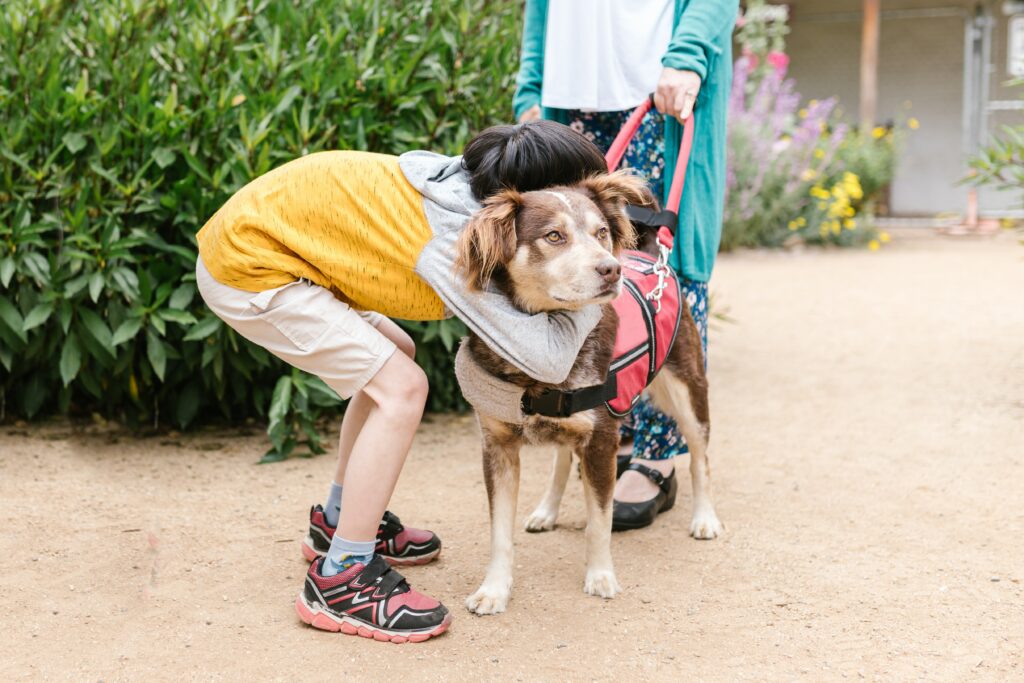The Powerful Role of Dog Companions in Enhancing the Lives of Autistic Children
For many children with autism, social interactions can be a significant challenge. The introduction of a canine companion can often provide a powerful and transformative impact. These special dogs, trained specifically to act as faithful allies, aid in improving communication skills, reducing anxiety, and offering an overall sense of calm and security for autistic kids. These life-changing relationships between dogs and autistic children not only improve quality of life but also facilitate personal development and independence. Understanding the profound impact canine companions have on individuals with autism is an integral step toward inclusive societal norms. It is clear, that having dog companions enhances the lives of autistic children.

Discovering the Powerful Effect of Dogs on Children with Autism
Autistic children often struggle with stress, anxiety and isolation, but all that can be curbed with the help of one noble animal – a dog. Canine Companions, as we like to call them, are exploring a potential profound impact on children with Autism. These loyal friends don’t just provide invaluable companionship, they also provide a sense of security to autistic children, making them feel more connected to their surroundings. These specially trained furry aides aren’t just limited to offering emotional support, but they can actually assist children in managing their daily activities and improve physical coordination. They can serve as great communicative facilitators, thus bridging the communication gap between autistic children and the rest of the world.
The ever loyal canine companions provide relief from stressful situations, and their dependable presence offers comfort to children during challenging times. In the face of adversity, they have a truly uncanny ability to provide unconditional love, which can work wonders in easing anxiety levels. In essence, our canine companions are much more than pets; they’re integral tools for enhancing the development of children with autism.
A canine companion’s role as a vigilant caretaker plays a significant part in keeping autistic children secure by alerting them to potential hazards such as unfamiliar individuals or startling noises. Furthermore, pups can be a supportive presence that helps the children articulate their emotions in a wholesome way, which can prove comforting during emotionally challenging times. Canine companions can make a vast difference in the lives of autistic children, providing them with a sense of security, friendship, and emotional support. Autistic children can witness an enhancement in their social skills, a decrease in their anxiety levels, and get a secure space to learn how to express their feelings constructively with the association of a devoted canine friend.

Exploring the Incredible Impact of Canine Companions on Kids with Autism
The role of Canine Companions in the lives of children with autism cannot be overstated. These friendly, loyal pets can be monumental in their impact, introducing a sense of calm and non-judgmental companionship into an environment which can, at times, feel overwhelming and chaotic to an autistic child. The bond between an autistic child and their dog can transcend traditional companionship, becoming a source of undiluted love and comfort. This unique relationship encourages autistic children to hone their social skills and enhances their ability to concentrate. This companionship often results in significant advantages for the child’s social and mental development. Canine Companions, through their distinct tactile feedback and sensory comfort, also assist children with autism in recognizing and modulating their emotions. This form of therapy can often facilitate advancements in emotional control that traditional treatments have challenges addressing effectively. Furthermore, these dogs can be specially trained to act as assistance animals, providing benefits such as alerting parents when a child is perturbed. This gives caregivers an additional layer of support when dealing with episodes of distress or episodes of unknown triggers.
In a fresh exploration of our timeless relationship with canine companions; a growing body of research is shedding light on the impressive influence dogs can have on children diagnosed with autism. Time and again, the phrase “dogs are man’s best friend” rings true, but now, it seems the benefits extend beyond mere companionship. For children with autism, interacting with dogs has been shown to significantly aid in the cultivation of social and communicative abilities. Furthermore, these four-legged friends supply invaluable comfort, offer a fun avenue for physical activity, and present enjoyable opportunities for playtime. Interestingly, specific breeds appear to have the edge in serving as beneficial companions for children with autism. Labrador Retrievers, Golden Retrievers, Shetland Sheepdogs, and Poodles make the list for their exceptionally helpful temperament. However, the size of the dog also matters. Smaller breeds may provide an advantage, as their size is less daunting and easier to manage for children with special needs. In addition to providing a substantial sense of security, dogs can help children feel a profound sense of comfort and safety within their environment. The playtime they offer can work wonders in reducing stress and anxiety levels.
The Influence of Service Dogs on Children Diagnosed with Autism Spectrum Disorder (ASD)
In review of the incredible partnership between Canine Companions and children diagnosed with Autism Spectrum Disorder (ASD), it’s impossible to ignore the profound impact service dogs have on the lives of these children and their caregivers. These specialized dogs from Canine Companions offer much-needed comfort, companionship and emotional support, helping children face and overcome challenges in social scenarios and building their self-reliance and confidence. Service dogs aid in reducing anxiety levels and enhance their communication skills. These trained companions offer a sense of safety, thereby relieving both the child and their caregiver of stress related to everyday tasks. Beyond providing practical support in routine activities such as eating, dressing and toileting, they also encourage positive behavior changes. A critical role of service dogs is to provide a solid emotional backbone during turbulent times, proving them to be an invaluable asset for families with ASD diagnosed children. Canine Companions, an organization leading this remarkable field of service dog training, is dedicated to enriching the lives of ASD diagnosed children and their families. Their mission is to provide children with a service dog that is uniquely trained and perfectly paired to cater to their specific needs.

